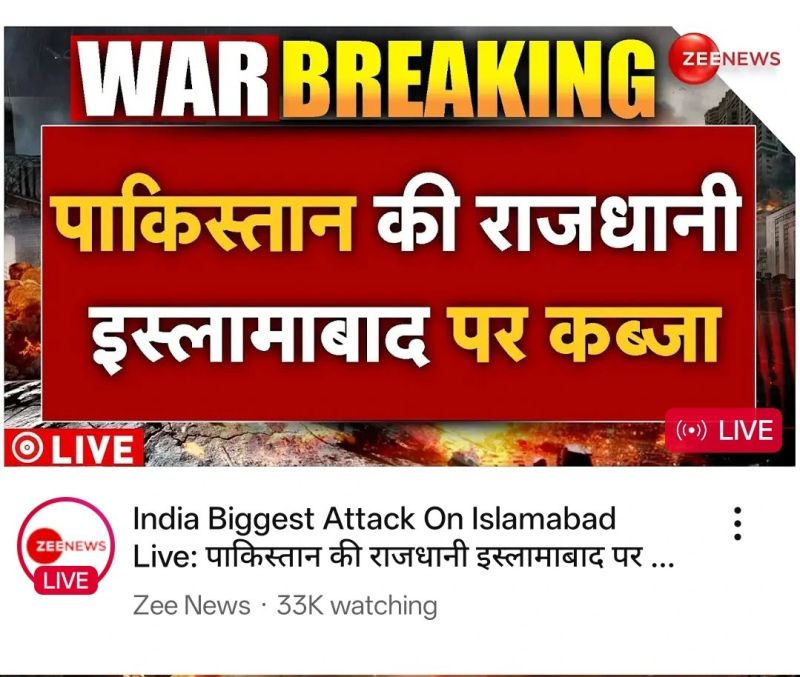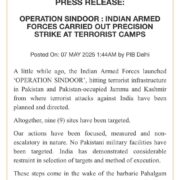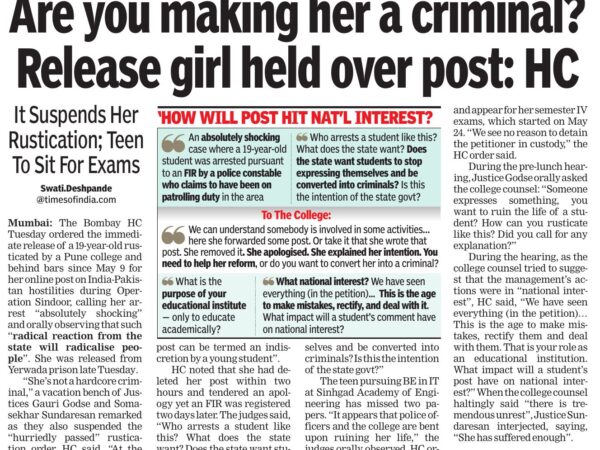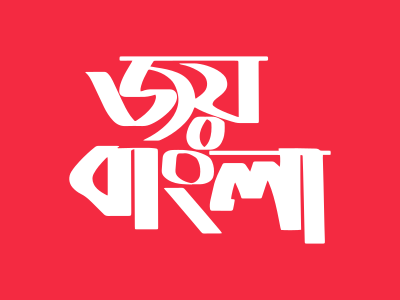
Truth, they say, is the first casualty of war, yet even more grievous is the loss of the one weapon designed to safeguard it, a free and fair press. In our democracy that weapon was unmatched in potency. It could have cut through propaganda, pierced through panic and linked the world to our narrative. Instead, we dismantled it, willingly selling its parts to the highest bidder and applauding each transaction as though it bore no consequence.
This conflict, whatever euphemism we choose, began not with tanks or missiles but with terror in a Pahalgam meadow. Twenty six Indian tourists were butchered and the photograph of a young bride in her sindoor and bangles, seated beside her husband’s mutilated body, seared itself into every heart. So powerful was that image that the military christened our response Operation Sindoor.
The symbolism did not end there. Colonel Sofiya Qureshi and Wing Commander Vyomika Singh, disciplined and precise, stood before the cameras and delivered verified facts. Two women communicating truth while our newsrooms morphed into theatres of the absurd. Anchors breathlessly declared that the Pakistani Army chief had been deposed, that Indian tanks were rolling into Lahore, Rawalpindi and Islamabad, that Karachi port lay in ruins. By morning every one of those claims had evaporated with no apology or correction, to be replaced by fresh fabrications for the next night’s audience.
Our collapse did not occur overnight. It was death by a thousand small sales. NDTV, once the quiet conscience of Indian television and home to Ravish Kumar, Magsaysay Award winner and fearless critic of media capture, was quietly subsumed by corporate interests, prompting Kumar’s dignified resignation in protest. Republic TV erupted onto the scene as a cacophony built to incite rather than inform. CNN-IBN, once our window to the world, became little more than a shop display after its parent fell under corporate control. ABP News and our venerable print dailies traded investigative rigour for boardroom balance sheets. Editors were replaced by brand managers, reporters told not to complicate stories with inconvenient truths and revenue targets routinely trumped editorial integrity. Our watchdog became a lapdog, an overcaffeinated, flag-wrapped chihuahua barking in its own echo.
And in that noise we surrendered our greatest strategic asset. A free, credible, respected press is no mere civic luxury; it is our most potent force multiplier. It steadies shaky markets, reassures uncertain allies, tempers mass hysteria and above all projects soft power. Imagine a Pakistani civilian, sceptical of their own outlets, turning to ours for an honest account; a Western diplomat briefing their government with Indian reportage; an NRI in London feeling informed rather than embarrassed; a hedge fund in Singapore holding its nerve because it trusted our numbers. That was power. We had it. We set it ablaze in pursuit of ratings.
Even global broadcasters have bowed to convenient national narratives. The BBC insists on “Indian-administered Kashmir” and calls the Pahalgam assailants “militants,” avoiding the term “terrorists.” CNN similarly downgrades the massacre to “gunmen” and “attackers.” Al Jazeera, once celebrated for uncompromising Middle Eastern coverage, now echoes the Islamist leanings of its funders and even sidesteps maps affirming Kashmir’s status within India. No outlet remains unsullied, each bowing to the government or ideology it believes it serves.
This is not merely an Indian affliction. Across the United States “my country, right or wrong” has become a rallying cry for partisan media, in Türkiye state television parades narrow nationalism, Russia’s RT dutifully echoes Kremlin talking points and in Hungary and Poland pro-government outlets drown out dissent. When patriotism outweighs truth the free press is enlisted as another soldier in the culture war.
Amid this cacophony, I still turn to three voices that refuse to compromise: Faye D’Souza’s Beatroot, meticulous and unhurried; Barkha Dutt’s Mojo Story, urgent yet rigorously verified; and Ravish Kumar, whose essays now shared online remain the sharpest indictment of media capture. On X, I follow @altnews, @boomlive, @factlyindia, @thequint, and @thewire_in alongside Reuters and AP to piece together fragments of truth. I also read a lot of print, especially The Hindu and Indian Express. At least as this is being written, the mainstream print has remained one last bastion of truth, if not totally unbiased and impartial.
If you know other trusted platforms or voices please share them below. Let us reconstruct our arsenal of credibility one link at a time. Because without truth even the loudest victory rings hollow.



















